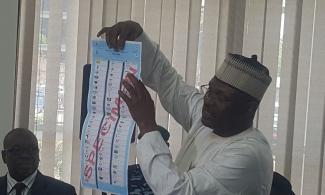
"We must decide whether the constitutional conditions for the registration of political parties are adequate to make for the registration of political parties that genuinely sponsor candidates and have something new to offer to the Nigerian people. The ballot papers are getting more complicated for the Nigerian people."

The Independent National Electoral Commission (INEC) says it is up to Nigerians to decide if the proliferation of political parties will offer something new for the country.
According to the commission, the electoral process is getting more complicated, especially with more parties registering to participate in elections.
In the February 23 general election, 73 parties fielded presidential candidates while more than 90 parties were approved to participate in the elections.
Speaking at the presentation of certificates of return to Samuel Ortom, Governor of Benue State, his deputy and members of the state House of Assembly in Makurdi, the Benue State capital, over the weekend, Festus Okoye, INEC National Commissioner and chairman of the Information and Voter Education Committee, noted that while the commission had the constitutional powers to deregister a political party, it was up to Nigerians to decide if they wanted to continue with the proliferation of parties.
His words: “INEC believes that the Nigerian people need a national conversation on the regime of political parties and their administration. The Nigerian people must on their own, through elected representatives determine whether we need, and can accommodate over a hundred political parties in our electoral process. We must decide whether the constitutional conditions for the registration of political parties are adequate to make for the registration of political parties that genuinely sponsor candidates and have something new to offer to the Nigerian people.
“The ballot papers are getting more complicated for the Nigerian people. Sorting, counting and entering the scores of candidates in Form EC8A series is becoming more cumbersome. Polls are closing late on account of the number of parties and ad hoc staff of the commission in remote areas and difficult terrains are exposed to danger.
“It is also becoming difficult husbanding and protecting result sheets from the polling units to the collation centres as armed gangs are getting more vicious when targeting result sheets of the commission. It is therefore imperative that Nigerians hold a national conversation on the number of political parties and the requirements for their registration.
“While the commission can deregister parties that fail to meet the constitutional threshold embedded in the 4th Alteration to the constitution, it takes deregistered parties 30 days to make a comeback as a registered political party can reapply and get registered on the liberal conditions in the constitution. It is also imperative for the commission to proceed and implement the duality of manual and electronic collation and transmission.”
On the importance of supplementary elections, he continued: “The concept of supplementary elections and the application of the margin of lead principle in our electoral process are not insidious or alien to our electoral process. It is a constitutional provision that gives life and meaning to the vote and the sovereign right of the people to decide who governs them.
The commission is of the firm opinion that it is unconstitutional and illegal to disenfranchise a whole community based on its inability to deploy materials and personnel on account of logistic challenges. It will be unjust and inequitable to disenfranchise a people based on a vicious determination by political opponent to reduce the votes from targeted communities through contrived mayhem and insecurity.
“The voices and votes of the people will be meaningless if the commission is forced to retreat from conducting elections in certain communities. It will be inequitable to deprive the people of the power of the vote despite natural disasters or other emergencies that prevented them from exercising their mandate.
“It is against the law to reward people who deliberately undermine the use of the Smart Card Readers in the electoral process. The concept of margin of lead and the organization of supplementary elections are constitutional and electoral safeguards deliberately inserted in our laws and constitution to give meaning to the concept of the vote and prevent serial electoral violators from undermining the electoral process.
“What the Nigerian people need is a robust, honest, professional and ethical security architecture that secures the electoral environment and gives the vote the requisite voice. While constitutional and electoral reforms are inevitable, we must not become addicted to electoral and constitutional reforms at the slightest sight of contrived challenges and roadblocks.”